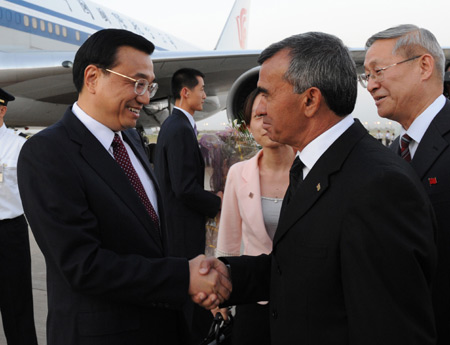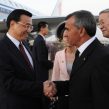
China to Increase Gas Imports From “Economically Complementary” Turkmenistan
Publication: Eurasia Daily Monitor Volume: 6 Issue: 125
By:

Chinese demand is voracious for Turkmen gas. Russia’s import stoppage (see above article) can only strengthen Turkmenistan’s motivation to start exports to China on schedule in early 2010. With Russia demonstrating its unreliability as a gas importer (let alone supplier to others), Beijing is using this opportunity to increase the volume of its future imports of Turkmen gas beyond the volumes already agreed.
On June 24-25 Chinese Deputy Prime Minister Li Keqiang led a governmental delegation to Turkmenistan for discussions on gas and related projects. Turkmen President Gurbanguly Berdimuhamedov reaffirmed the commitment to put the Turkmenistan-China pipeline into operation by December 2009 on Turkmen territory, with first gas to flow at the beginning of 2010. Agreements entered into by Berdimuhamedov’s predecessor, Saparmurat Niyazov, in 2006 envisaged deliveries of 30 bcm of Turkmen gas per year to China, starting in 2010 for a 30-year period.
The Chinese delegation, moreover, signed agreements to increase Turkmen gas deliveries from the existing contract area; and possibly to dedicate new Turkmen gas fields to supplying China. Under the additional sale-and-purchase agreement just signed, Turkmengaz shall deliver another 10 bcm per year to the China National Petroleum Corporation (CNPC) during the same 30-year period, on top of the annual 30 bcm previously agreed. The 40 bcm annual figure comes close to Russia’s import of Turkmen gas and is not the final target for China. CNPC is the first foreign company to develop major onshore fields under license in Turkmenistan.
During this visit, China’s State Development Bank opened a $4 billion credit line on soft terms to Turkmengaz through an intergovernmental agreement (the sides had tentatively agreed on $3 billion in May). This credit is expected to finance exploration and development in the new, supergiant gas fields South Yolotan and Osman and possibly elsewhere in Turkmenistan. Thus, China’s intake of Turkmen gas may surpass Russia’s in the years ahead, if these projects are completed.
Under another agreement signed on the same occasion, China’s Petrochina International and Turkmenistan’s Agency for Development of Natural Resources will expand the extraction of gas and condensate in the onshore Bagtyarlik contract area and other gas fields on the right bank of the Amu Darya River. That area in eastern Turkmenistan is the main supply source for the pipeline being built to China (www.turkmenistan.ru, Turkmen Television, Interfax, Xinhua, June 24, 25; Kommersant, June 25).
The 7,000 kilometer pipeline is projected to run from Turkmenistan via the territories of Uzbekistan and Kazakhstan to China’s Xinjiang region. From there, a continuation West-East pipeline is planned to carry the Turkmen gas to cities in China’s interior and eventually the eastern coast.
A separate Chinese credit worth $300 million will finance construction of a nitrate-based fertilizer factory in Turkmenistan, mainly for the needs of Chinese agriculture. A few other light-industry projects are also in this package. Fertilizer production being intensively gas-consuming, it is cost-effective for China to locate such a plant at the source of gas in Turkmenistan. According to Li Keqiang, China’s national goal to increase grain production explains its rapidly growing demand for fertilizers. With potassium-based fertilizer in short supply, China is creating a basis for nitrate-based fertilizer production in Turkmenistan (Xinhua, June 24).
Beijing seems anxious to avoid delays in the implementation of these ambitious projects. "The Chinese side is very hopeful that all accords we have reached will be implemented as soon as possible," Li declared. Addressing the Chinese work force at the PetroChina Turkmenistan Amu Darya Corporation, Li urged them to "defy hardship and fight continuous battles [to] achieve the set goal of completing the project on schedule, in the long-term interests of the two countries" (Xinhua, June 24, 25).
The Chinese are offering Turkmenistan additional incentives, unrelated to the gas project as such, but intended to advance overall cooperation and China’s own presence in the country. The delegation offered financing for a glass factory in Turkmenistan; a gift of computers (in the framework of a non-reimbursable assistance grant arranged last year); and an increase in the number of Turkmen student scholarships in China to 90 per year. Implementation agreements were also signed on these issues (Interfax, June 25).
Beijing assumes that "China and Turkmenistan have highly complementary economies," according to the delegation in Ashgabat (Xinhua, June 24). This assessment may be read as reflecting a Chinese policy goal for the years ahead. It could become reality if China becomes a major, second-to-none export destination for Turkmen gas and continues to generate collateral projects in the country.
From Turkmenistan’s perspective as a gas exporting country, "security of demand" looks clearly more promising in China, compared with Russia. This is the case both at present and for the foreseeable future, given the strong durable growth in Chinese demand for gas. Ironically, it was Gazprom and the Kremlin who were insisting recently on "security of demand" as a condition to long-term gas supply contracts with European countries. As it turns out, however, Russia itself failed again (as on several past occasions) to provide security of demand for Turkmenistan. This time, moreover, Moscow needed the April 9 "accident" as an excuse for halting imports of Turkmen gas entirely and demanding revision of the signed contracts.
Politically, on this visit as on other occasions, the Chinese side pledged support to "strengthening Turkmenistan’s international positions and upholding its policy of permanent neutrality." Berdimuhamedov in turn underscored "the continuation of the practice of regular contacts on the state and government levels" with China (Turkmen TV, June 24).
A state-driven policy enables Beijing (as it enables Moscow in many other cases) to offer multifaceted package deals for access to mineral resources abroad. In Turkmenistan’s case, China is financing the gas project up-front, guarantees demand, creates spin-off projects in the country, carefully cultivates political relations with the country’s leadership, opens access to the country and its resources ahead of the West, and is now successfully competing with Russia who had been there ahead of China.




